AMD Zen 3 Ryzen Deep Dive Review: 5950X, 5900X, 5800X and 5600X Tested
by Dr. Ian Cutress on November 5, 2020 9:01 AM ESTCPU Tests: Encoding
One of the interesting elements on modern processors is encoding performance. This covers two main areas: encryption/decryption for secure data transfer, and video transcoding from one video format to another.
In the encrypt/decrypt scenario, how data is transferred and by what mechanism is pertinent to on-the-fly encryption of sensitive data - a process by which more modern devices are leaning to for software security.
Video transcoding as a tool to adjust the quality, file size and resolution of a video file has boomed in recent years, such as providing the optimum video for devices before consumption, or for game streamers who are wanting to upload the output from their video camera in real-time. As we move into live 3D video, this task will only get more strenuous, and it turns out that the performance of certain algorithms is a function of the input/output of the content.
HandBrake 1.32: Link
Video transcoding (both encode and decode) is a hot topic in performance metrics as more and more content is being created. First consideration is the standard in which the video is encoded, which can be lossless or lossy, trade performance for file-size, trade quality for file-size, or all of the above can increase encoding rates to help accelerate decoding rates. Alongside Google's favorite codecs, VP9 and AV1, there are others that are prominent: H264, the older codec, is practically everywhere and is designed to be optimized for 1080p video, and HEVC (or H.265) that is aimed to provide the same quality as H264 but at a lower file-size (or better quality for the same size). HEVC is important as 4K is streamed over the air, meaning less bits need to be transferred for the same quality content. There are other codecs coming to market designed for specific use cases all the time.
Handbrake is a favored tool for transcoding, with the later versions using copious amounts of newer APIs to take advantage of co-processors, like GPUs. It is available on Windows via an interface or can be accessed through the command-line, with the latter making our testing easier, with a redirection operator for the console output.
We take the compiled version of this 16-minute YouTube video about Russian CPUs at 1080p30 h264 and convert into three different files: (1) 480p30 ‘Discord’, (2) 720p30 ‘YouTube’, and (3) 4K60 HEVC.
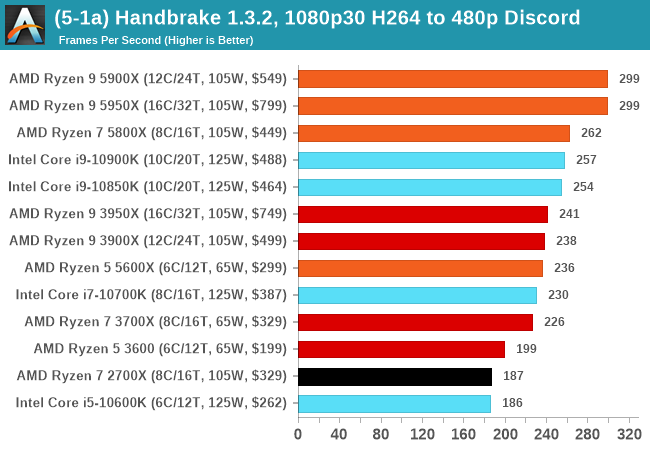
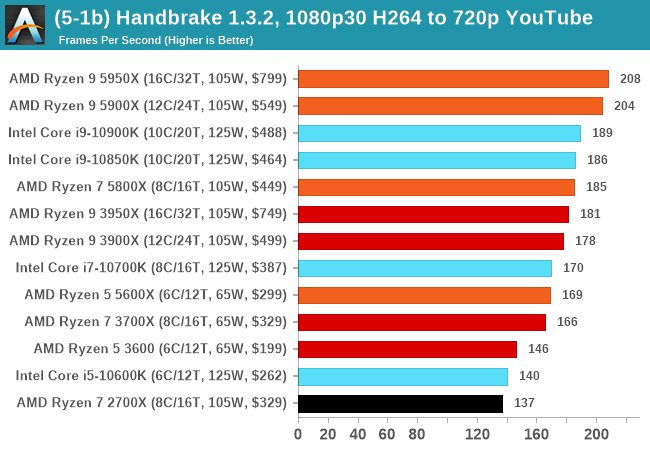
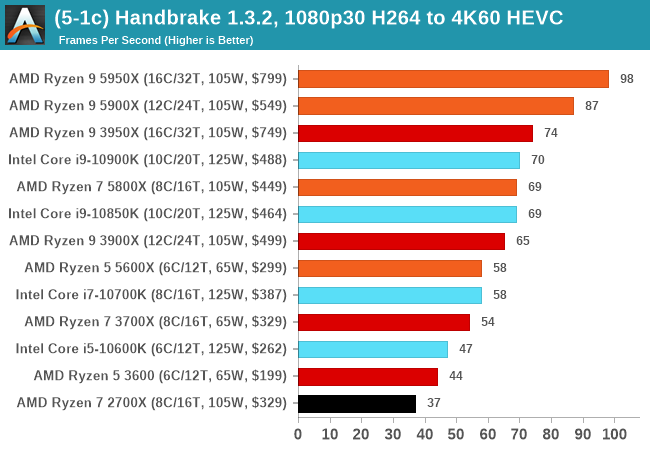
7-Zip 1900: Link
The first compression benchmark tool we use is the open-source 7-zip, which typically offers good scaling across multiple cores. 7-zip is the compression tool most cited by readers as one they would rather see benchmarks on, and the program includes a built-in benchmark tool for both compression and decompression.
The tool can either be run from inside the software or through the command line. We take the latter route as it is easier to automate, obtain results, and put through our process. The command line flags available offer an option for repeated runs, and the output provides the average automatically through the console. We direct this output into a text file and regex the required values for compression, decompression, and a combined score.
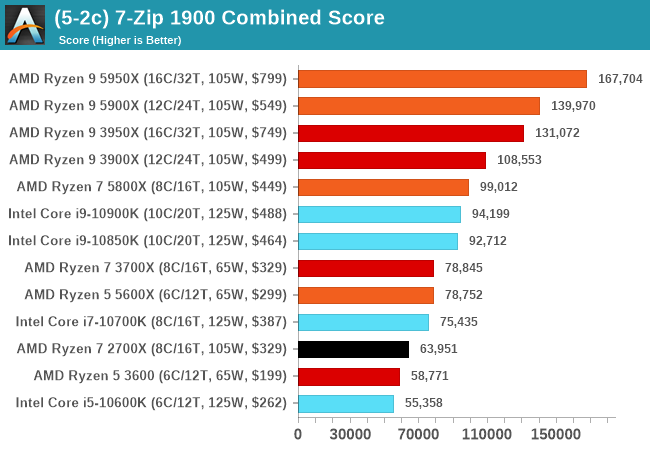
AES Encoding
Algorithms using AES coding have spread far and wide as a ubiquitous tool for encryption. Again, this is another CPU limited test, and modern CPUs have special AES pathways to accelerate their performance. We often see scaling in both frequency and cores with this benchmark. We use the latest version of TrueCrypt and run its benchmark mode over 1GB of in-DRAM data. Results shown are the GB/s average of encryption and decryption.
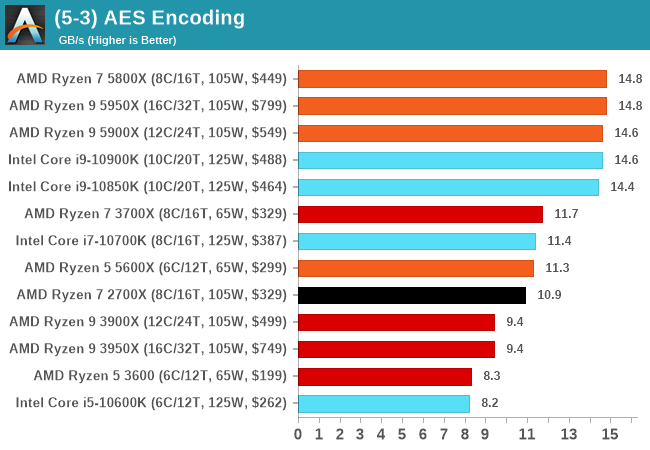
WinRAR 5.90: Link
For the 2020 test suite, we move to the latest version of WinRAR in our compression test. WinRAR in some quarters is more user friendly that 7-Zip, hence its inclusion. Rather than use a benchmark mode as we did with 7-Zip, here we take a set of files representative of a generic stack
- 33 video files , each 30 seconds, in 1.37 GB,
- 2834 smaller website files in 370 folders in 150 MB,
- 100 Beat Saber music tracks and input files, for 451 MB
This is a mixture of compressible and incompressible formats. The results shown are the time taken to encode the file. Due to DRAM caching, we run the test for 20 minutes times and take the average of the last five runs when the benchmark is in a steady state.
For automation, we use AHK’s internal timing tools from initiating the workload until the window closes signifying the end. This means the results are contained within AHK, with an average of the last 5 results being easy enough to calculate.
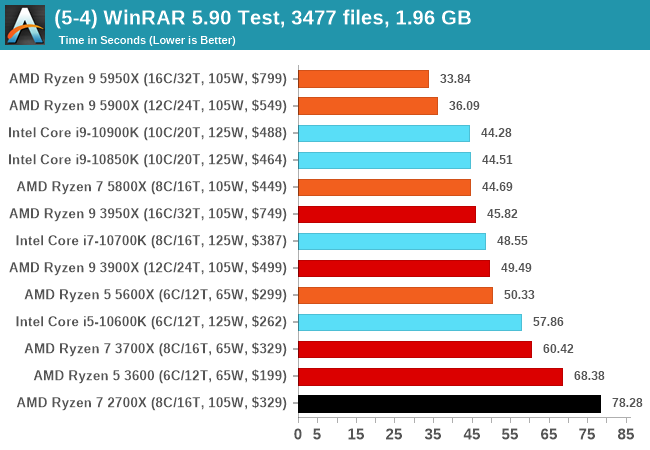


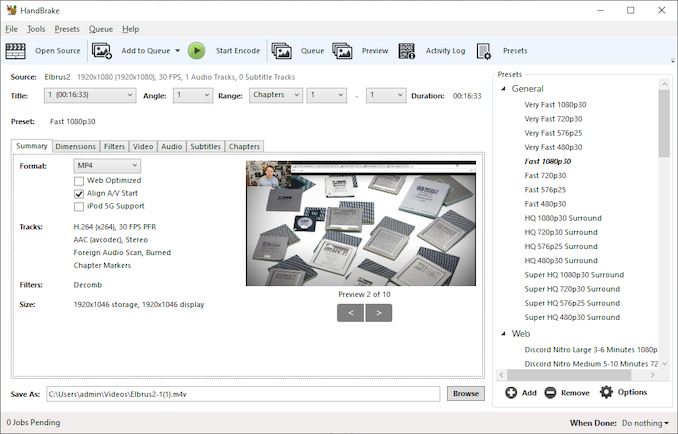
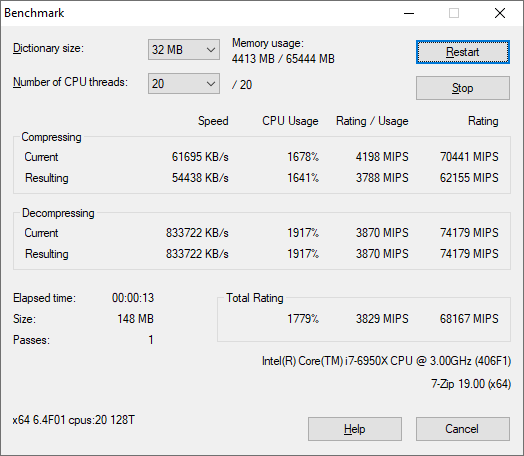
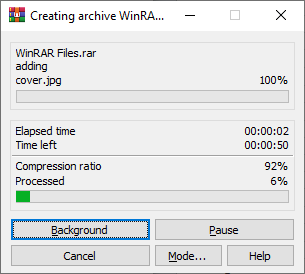








339 Comments
View All Comments
jakky567 - Tuesday, November 24, 2020 - link
Total system, I think the 5950x should be more popular. That being said, the 5900x is still great.mdriftmeyer - Monday, November 9, 2020 - link
I spend $100 or more per week on extra necessities from Costco. Your price hike concerns are laughable.bananaforscale - Monday, November 9, 2020 - link
5900X has good binning and the cheapest price per core. For productivity 3900X has *nothing* on 5900X for the 10% price difference and 5950X is disproportionately more expensive. Zen and Zen+ are not an option if you want high IPC, 3300X basically doesn't exist... I'll give you that 3600 makes more sense to most people than 5600X, it's not that much faster.Kangal - Wednesday, November 11, 2020 - link
"Price per Core".... yeah, that's a pointless metric.What you need to focus on is "Price per Performance", and this should be divided into two segments: Gaming Performance, Productivity Performance. You shouldn't be running productivity tools whilst gaming for plenty of reasons (game crashes, tool errors, attention span, etc etc). The best use case for a "mixed/hybrid" would be Twitch Gaming, that's still a niche case.... but that's where the 5800X and 5900X makes sense.
Now, I don't know what productivity programs you would use, nor would I know which games you would play, or if you plan on becoming a twitcher. So for your personal needs, you would have to figure that out yourself. Things like memory configurations and storage can have big impacts on productivity. Whereas for Gaming the biggest factor is which GPU you use.
What I'm grasping at is the differences should/will decrease for most real-world scenarios, as there is something known as GPU scaling and being limited or having bottlenecks. For instance, RTX 2070-Super owners would target 1440p, and not 1080p. Or RTX 3090 owners would target 4K, and not for 1440p. And GTX 1650 owners would target 1080p, they wouldn't strive for 4K or 1440p.
For instance, if you combine a 5600X with a Ultra-1440p-card, and compare the performance to a 3600X, the differences will diminish significantly. And at Ultra/4K both would be entirely GPU limited, so no difference. So if you compare a 5800X to a 3900X, the 3900X would come cheaper/same price but offer notably better productivity performance. And when it comes to gaming they would be equal/very similar when you're (most likely) GPU limited. That scenario applies to most consumers. However, there are outliers or niche people, who want to use a RTX 3090 to run CS GO at 1080p-Low Settings so they can get the maximum frames possible. This article alludes to what I have mentioned. But for more details, I would recommend people watch HardwareUnboxed video from YouTube, and see Steve's tests and hear his conclusions.
Whereas here is my recommendation for the smart buyer, do not buy the 5600X or 5800X or 5900X. Wait a couple months and buy then. For Pure Gaming, get the r5-5600 which should have similar gaming performance but come in at around USD $220. For Productivity, get the r7-5700 which should have similar performance to the 5800X but come in at around USD $360. For the absolute best performance, buy the r9-5950x now don't wait. And what about Twitch Streamers? Well, if you're serious then build one Gaming PC, and a second Streaming PC, as this would allow your game to run fast, and your stream to flow fluidly.... IF YOU HAVE A GOOD INTERNET CONNECTION (Latency, Upload, Download).
lwatcdr - Monday, November 9, 2020 - link
"You can get the 3700 for much cheaper than the 5800X. Or for the same price you can get the 3900X instead."And if you want both gaming and productivity? They get the 5800X or 5900X. So AMD has something for every segment which is great.
TheinsanegamerN - Thursday, November 12, 2020 - link
The 5900x is margin of error from the 5950x in games, still shows a small uptick in gaming compared to 5800/5600x, offers far better performance then 5600/5800x in productivity tasks, and is noticeably cheaper then the 5950x.How on earth is that a non buy?
The rest may be better value for money, but by that metric a $2 pentium D 945 is still far better value for money depending on the task. The 5000 series consistently outperforms the 3000 series, offring 20% better performance for 10% better cash.
Kishoreshack - Saturday, November 14, 2020 - link
AMD has the best products to offerSoo you expect them to sell it at a cheaper rate than intel ?
Threska - Monday, November 16, 2020 - link
AMD has a good product RANGE, which means something for everyone AND all monies go to AMD regardless of consumer choice.Ninjawithagun - Friday, November 20, 2020 - link
The price hike is mainly to cover ongoing R&D for the next-gen Ryzen Zen 4 CPUs due out in 2022. The race between Intel and AMD must go on!jakky567 - Monday, November 23, 2020 - link
I disagree about the 5900x being a no buy.I feel like it goes 5950x for absolute performance. 5900x for high tier performance on a budget. And then the 3000 series for people on a budget, except the 3950x.
The 5900x has all the l3 cache.